Ethical Dilemma: Addressing a Peer's Social Media Post
VerifiedAdded on 2022/10/02
|11
|2506
|22
Report
AI Summary
This report analyzes an ethical dilemma involving a registered nurse (RN) who shared comments on Instagram regarding a difficult patient. The paper explores the ethical principles at play, including confidentiality, patient privacy, professional behavior, legal compliance, and the appropriate use of social media. It examines how the RN's actions violated these principles and discusses the importance of cultural safety, informed consent, and providing safe, quality nursing care. The report provides a literature review supporting these principles and outlines a plan for addressing the issue with the peer graduate RN, emphasizing the need to delete the post, adhere to professional standards, and respect patient privacy and confidentiality. The conclusion highlights the importance of ethical conduct, especially in the context of digital communication and the transition to clinical practice.
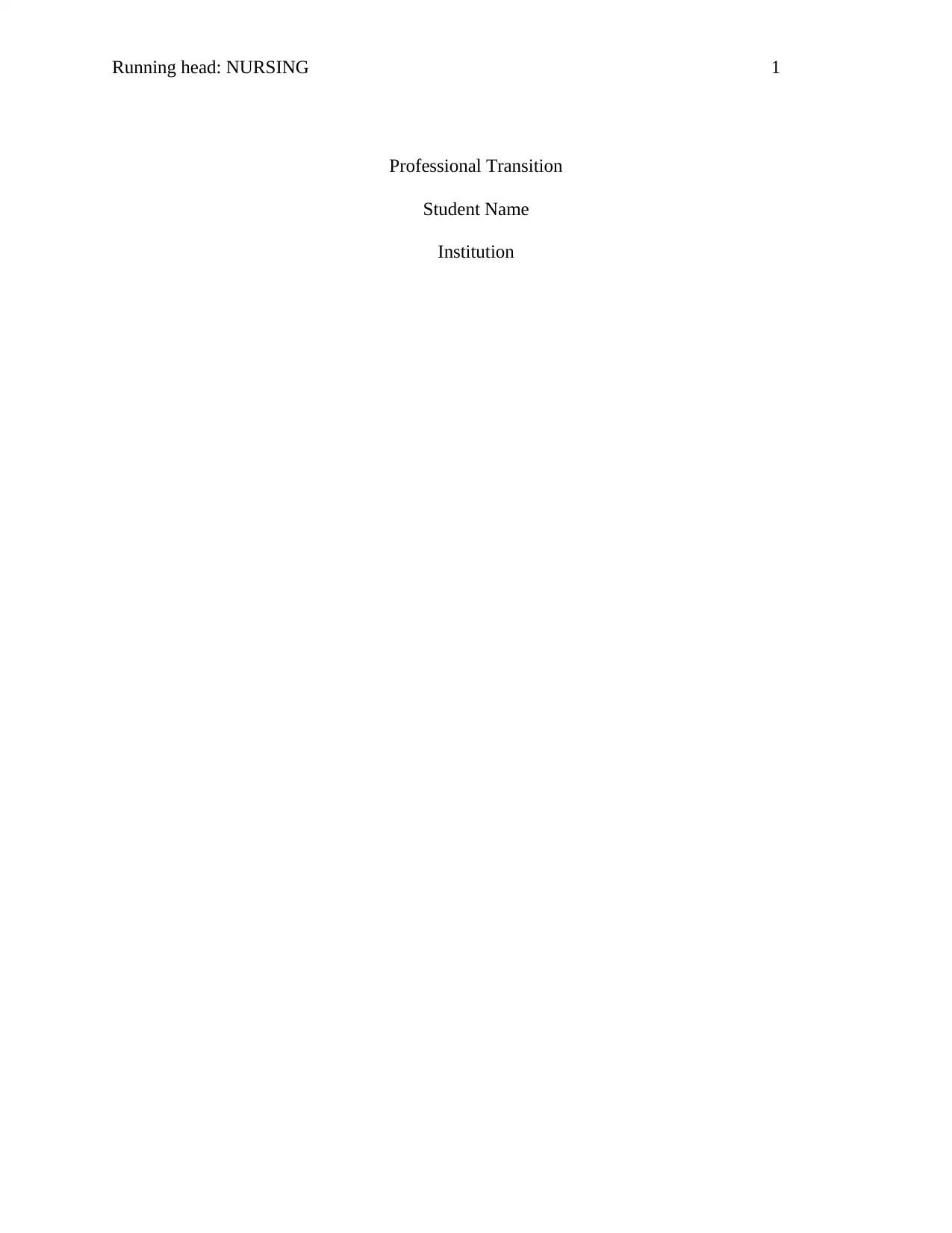
Running head: NURSING 1
Professional Transition
Student Name
Institution
Professional Transition
Student Name
Institution
Paraphrase This Document
Need a fresh take? Get an instant paraphrase of this document with our AI Paraphraser
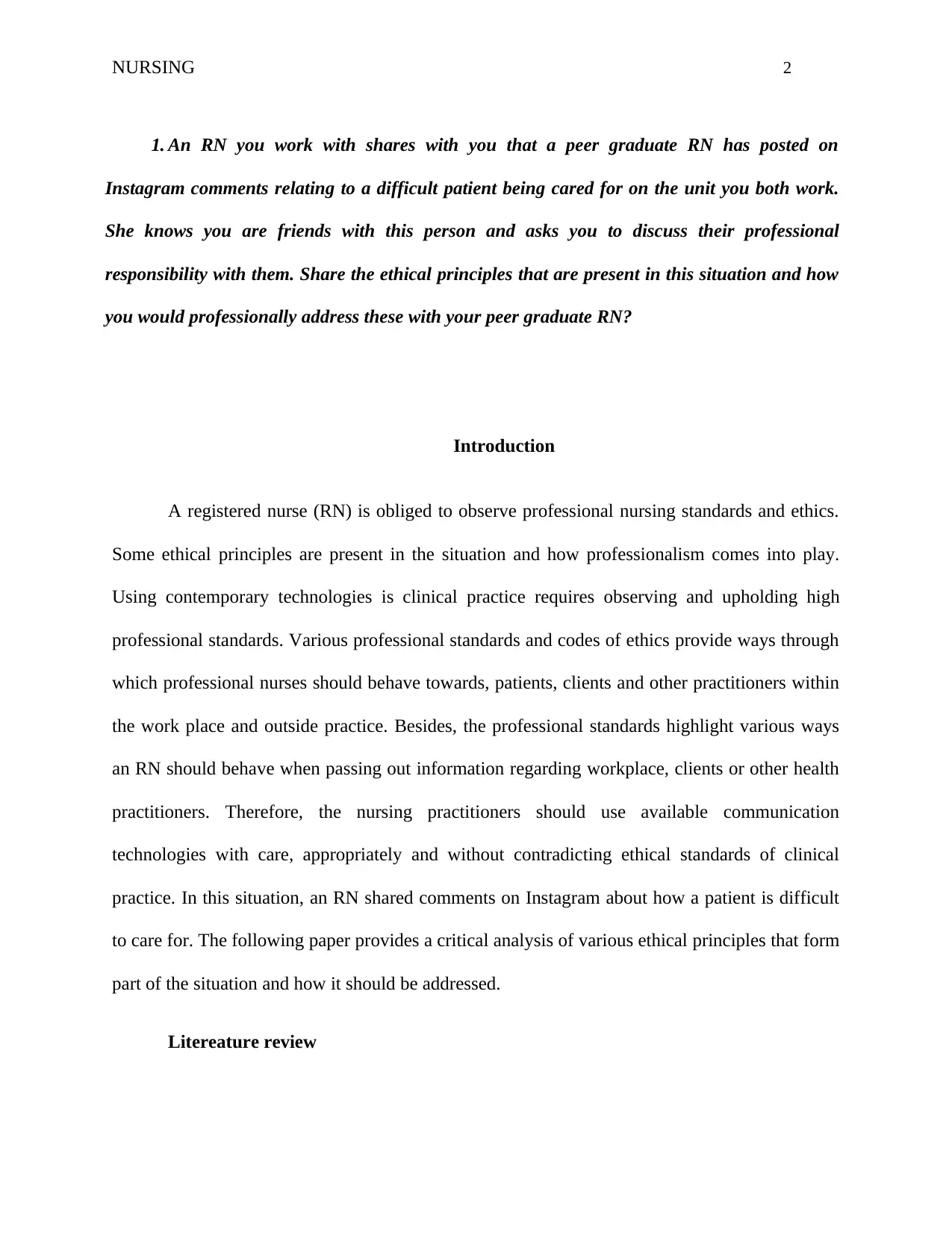
NURSING 2
1. An RN you work with shares with you that a peer graduate RN has posted on
Instagram comments relating to a difficult patient being cared for on the unit you both work.
She knows you are friends with this person and asks you to discuss their professional
responsibility with them. Share the ethical principles that are present in this situation and how
you would professionally address these with your peer graduate RN?
Introduction
A registered nurse (RN) is obliged to observe professional nursing standards and ethics.
Some ethical principles are present in the situation and how professionalism comes into play.
Using contemporary technologies is clinical practice requires observing and upholding high
professional standards. Various professional standards and codes of ethics provide ways through
which professional nurses should behave towards, patients, clients and other practitioners within
the work place and outside practice. Besides, the professional standards highlight various ways
an RN should behave when passing out information regarding workplace, clients or other health
practitioners. Therefore, the nursing practitioners should use available communication
technologies with care, appropriately and without contradicting ethical standards of clinical
practice. In this situation, an RN shared comments on Instagram about how a patient is difficult
to care for. The following paper provides a critical analysis of various ethical principles that form
part of the situation and how it should be addressed.
Litereature review
1. An RN you work with shares with you that a peer graduate RN has posted on
Instagram comments relating to a difficult patient being cared for on the unit you both work.
She knows you are friends with this person and asks you to discuss their professional
responsibility with them. Share the ethical principles that are present in this situation and how
you would professionally address these with your peer graduate RN?
Introduction
A registered nurse (RN) is obliged to observe professional nursing standards and ethics.
Some ethical principles are present in the situation and how professionalism comes into play.
Using contemporary technologies is clinical practice requires observing and upholding high
professional standards. Various professional standards and codes of ethics provide ways through
which professional nurses should behave towards, patients, clients and other practitioners within
the work place and outside practice. Besides, the professional standards highlight various ways
an RN should behave when passing out information regarding workplace, clients or other health
practitioners. Therefore, the nursing practitioners should use available communication
technologies with care, appropriately and without contradicting ethical standards of clinical
practice. In this situation, an RN shared comments on Instagram about how a patient is difficult
to care for. The following paper provides a critical analysis of various ethical principles that form
part of the situation and how it should be addressed.
Litereature review
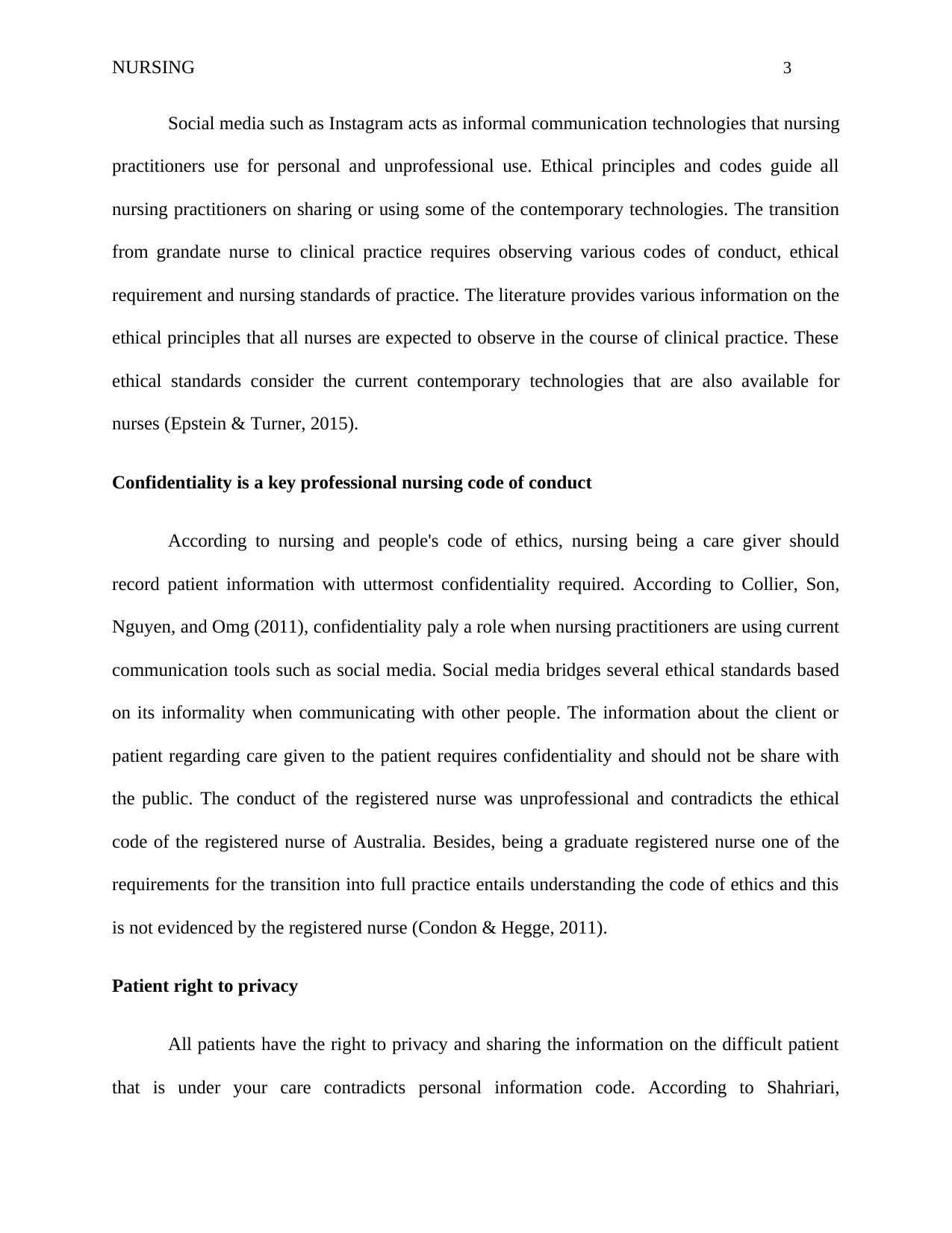
NURSING 3
Social media such as Instagram acts as informal communication technologies that nursing
practitioners use for personal and unprofessional use. Ethical principles and codes guide all
nursing practitioners on sharing or using some of the contemporary technologies. The transition
from grandate nurse to clinical practice requires observing various codes of conduct, ethical
requirement and nursing standards of practice. The literature provides various information on the
ethical principles that all nurses are expected to observe in the course of clinical practice. These
ethical standards consider the current contemporary technologies that are also available for
nurses (Epstein & Turner, 2015).
Confidentiality is a key professional nursing code of conduct
According to nursing and people's code of ethics, nursing being a care giver should
record patient information with uttermost confidentiality required. According to Collier, Son,
Nguyen, and Omg (2011), confidentiality paly a role when nursing practitioners are using current
communication tools such as social media. Social media bridges several ethical standards based
on its informality when communicating with other people. The information about the client or
patient regarding care given to the patient requires confidentiality and should not be share with
the public. The conduct of the registered nurse was unprofessional and contradicts the ethical
code of the registered nurse of Australia. Besides, being a graduate registered nurse one of the
requirements for the transition into full practice entails understanding the code of ethics and this
is not evidenced by the registered nurse (Condon & Hegge, 2011).
Patient right to privacy
All patients have the right to privacy and sharing the information on the difficult patient
that is under your care contradicts personal information code. According to Shahriari,
Social media such as Instagram acts as informal communication technologies that nursing
practitioners use for personal and unprofessional use. Ethical principles and codes guide all
nursing practitioners on sharing or using some of the contemporary technologies. The transition
from grandate nurse to clinical practice requires observing various codes of conduct, ethical
requirement and nursing standards of practice. The literature provides various information on the
ethical principles that all nurses are expected to observe in the course of clinical practice. These
ethical standards consider the current contemporary technologies that are also available for
nurses (Epstein & Turner, 2015).
Confidentiality is a key professional nursing code of conduct
According to nursing and people's code of ethics, nursing being a care giver should
record patient information with uttermost confidentiality required. According to Collier, Son,
Nguyen, and Omg (2011), confidentiality paly a role when nursing practitioners are using current
communication tools such as social media. Social media bridges several ethical standards based
on its informality when communicating with other people. The information about the client or
patient regarding care given to the patient requires confidentiality and should not be share with
the public. The conduct of the registered nurse was unprofessional and contradicts the ethical
code of the registered nurse of Australia. Besides, being a graduate registered nurse one of the
requirements for the transition into full practice entails understanding the code of ethics and this
is not evidenced by the registered nurse (Condon & Hegge, 2011).
Patient right to privacy
All patients have the right to privacy and sharing the information on the difficult patient
that is under your care contradicts personal information code. According to Shahriari,
⊘ This is a preview!⊘
Do you want full access?
Subscribe today to unlock all pages.

Trusted by 1+ million students worldwide
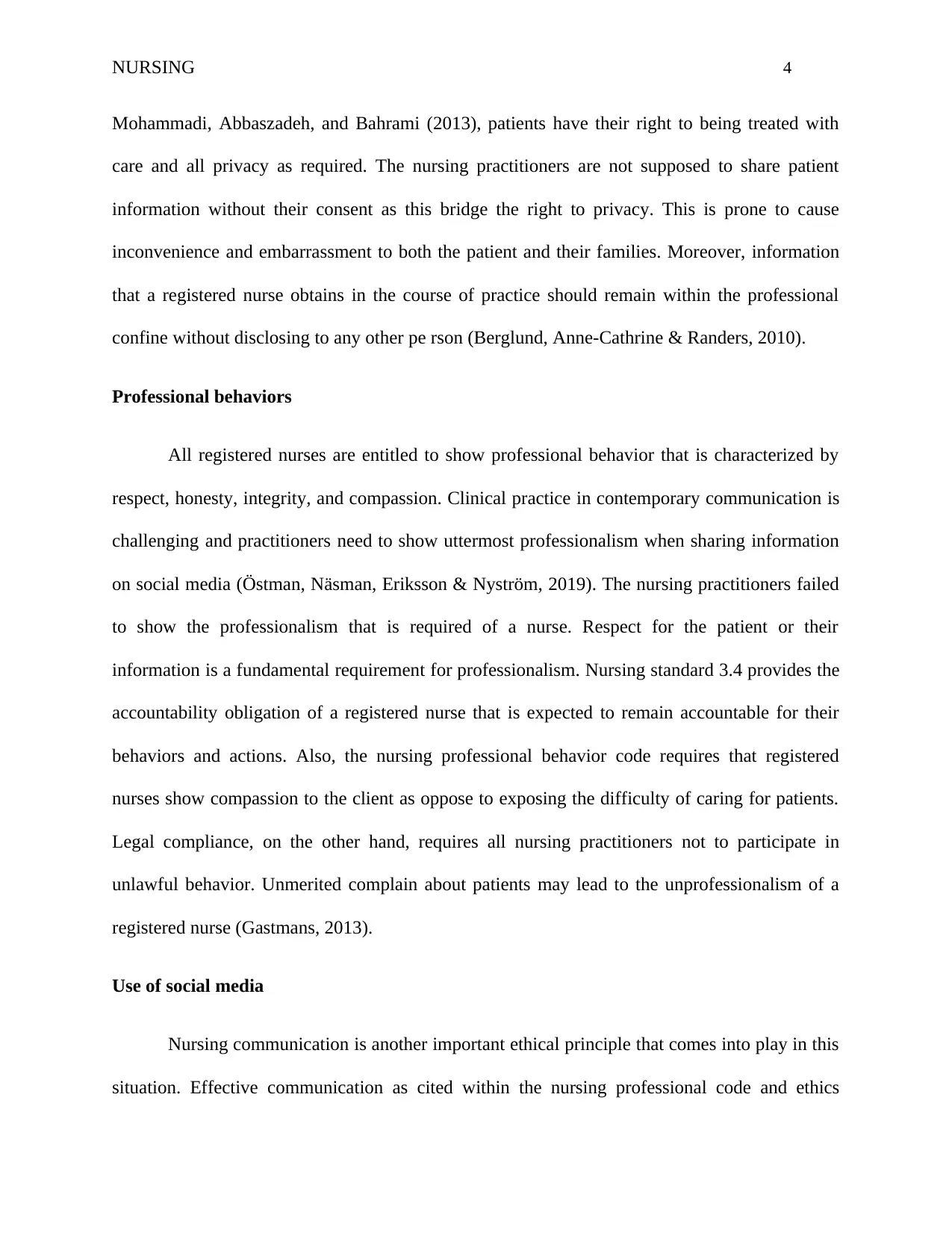
NURSING 4
Mohammadi, Abbaszadeh, and Bahrami (2013), patients have their right to being treated with
care and all privacy as required. The nursing practitioners are not supposed to share patient
information without their consent as this bridge the right to privacy. This is prone to cause
inconvenience and embarrassment to both the patient and their families. Moreover, information
that a registered nurse obtains in the course of practice should remain within the professional
confine without disclosing to any other pe rson (Berglund, Anne-Cathrine & Randers, 2010).
Professional behaviors
All registered nurses are entitled to show professional behavior that is characterized by
respect, honesty, integrity, and compassion. Clinical practice in contemporary communication is
challenging and practitioners need to show uttermost professionalism when sharing information
on social media (Östman, Näsman, Eriksson & Nyström, 2019). The nursing practitioners failed
to show the professionalism that is required of a nurse. Respect for the patient or their
information is a fundamental requirement for professionalism. Nursing standard 3.4 provides the
accountability obligation of a registered nurse that is expected to remain accountable for their
behaviors and actions. Also, the nursing professional behavior code requires that registered
nurses show compassion to the client as oppose to exposing the difficulty of caring for patients.
Legal compliance, on the other hand, requires all nursing practitioners not to participate in
unlawful behavior. Unmerited complain about patients may lead to the unprofessionalism of a
registered nurse (Gastmans, 2013).
Use of social media
Nursing communication is another important ethical principle that comes into play in this
situation. Effective communication as cited within the nursing professional code and ethics
Mohammadi, Abbaszadeh, and Bahrami (2013), patients have their right to being treated with
care and all privacy as required. The nursing practitioners are not supposed to share patient
information without their consent as this bridge the right to privacy. This is prone to cause
inconvenience and embarrassment to both the patient and their families. Moreover, information
that a registered nurse obtains in the course of practice should remain within the professional
confine without disclosing to any other pe rson (Berglund, Anne-Cathrine & Randers, 2010).
Professional behaviors
All registered nurses are entitled to show professional behavior that is characterized by
respect, honesty, integrity, and compassion. Clinical practice in contemporary communication is
challenging and practitioners need to show uttermost professionalism when sharing information
on social media (Östman, Näsman, Eriksson & Nyström, 2019). The nursing practitioners failed
to show the professionalism that is required of a nurse. Respect for the patient or their
information is a fundamental requirement for professionalism. Nursing standard 3.4 provides the
accountability obligation of a registered nurse that is expected to remain accountable for their
behaviors and actions. Also, the nursing professional behavior code requires that registered
nurses show compassion to the client as oppose to exposing the difficulty of caring for patients.
Legal compliance, on the other hand, requires all nursing practitioners not to participate in
unlawful behavior. Unmerited complain about patients may lead to the unprofessionalism of a
registered nurse (Gastmans, 2013).
Use of social media
Nursing communication is another important ethical principle that comes into play in this
situation. Effective communication as cited within the nursing professional code and ethics
Paraphrase This Document
Need a fresh take? Get an instant paraphrase of this document with our AI Paraphraser
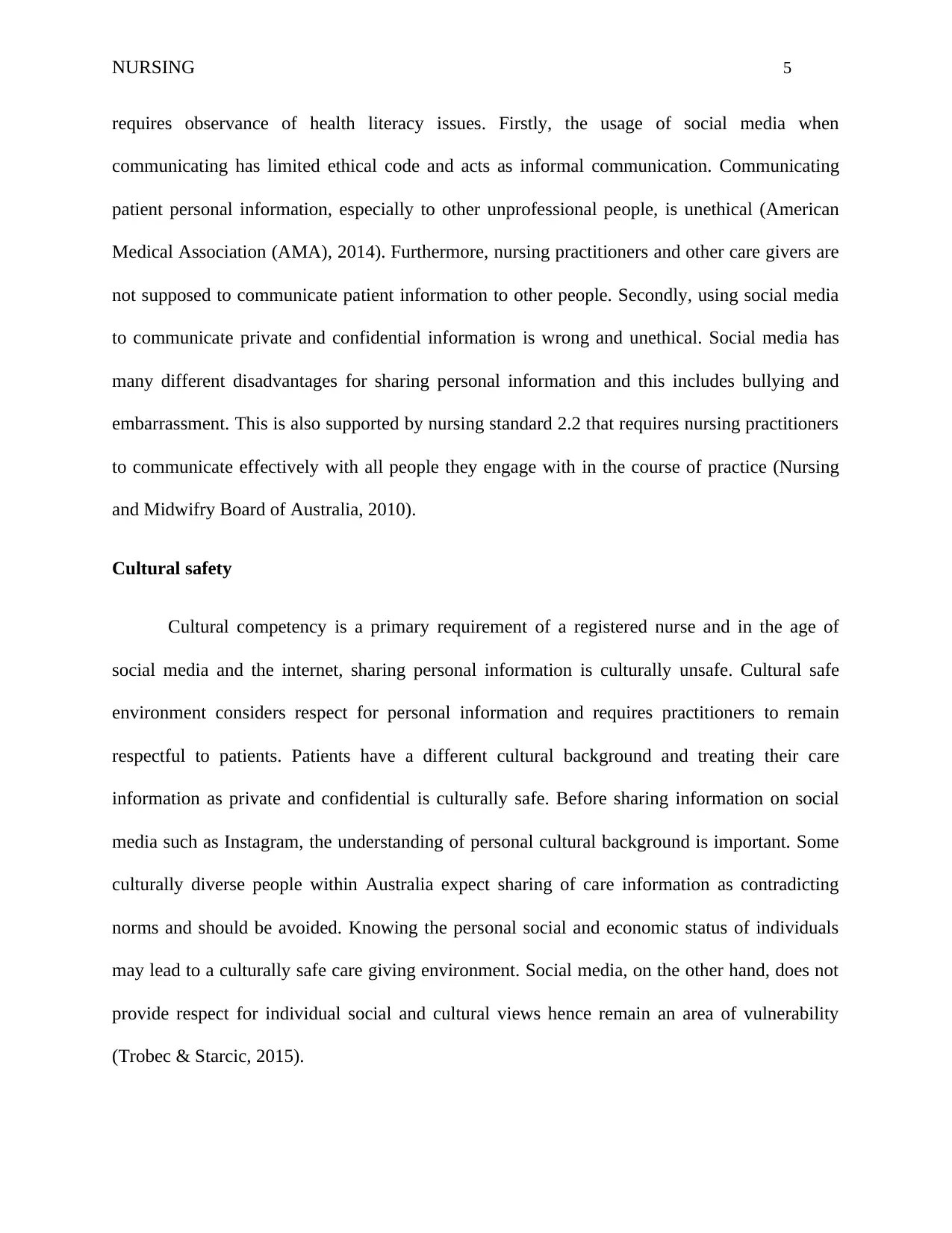
NURSING 5
requires observance of health literacy issues. Firstly, the usage of social media when
communicating has limited ethical code and acts as informal communication. Communicating
patient personal information, especially to other unprofessional people, is unethical (American
Medical Association (AMA), 2014). Furthermore, nursing practitioners and other care givers are
not supposed to communicate patient information to other people. Secondly, using social media
to communicate private and confidential information is wrong and unethical. Social media has
many different disadvantages for sharing personal information and this includes bullying and
embarrassment. This is also supported by nursing standard 2.2 that requires nursing practitioners
to communicate effectively with all people they engage with in the course of practice (Nursing
and Midwifry Board of Australia, 2010).
Cultural safety
Cultural competency is a primary requirement of a registered nurse and in the age of
social media and the internet, sharing personal information is culturally unsafe. Cultural safe
environment considers respect for personal information and requires practitioners to remain
respectful to patients. Patients have a different cultural background and treating their care
information as private and confidential is culturally safe. Before sharing information on social
media such as Instagram, the understanding of personal cultural background is important. Some
culturally diverse people within Australia expect sharing of care information as contradicting
norms and should be avoided. Knowing the personal social and economic status of individuals
may lead to a culturally safe care giving environment. Social media, on the other hand, does not
provide respect for individual social and cultural views hence remain an area of vulnerability
(Trobec & Starcic, 2015).
requires observance of health literacy issues. Firstly, the usage of social media when
communicating has limited ethical code and acts as informal communication. Communicating
patient personal information, especially to other unprofessional people, is unethical (American
Medical Association (AMA), 2014). Furthermore, nursing practitioners and other care givers are
not supposed to communicate patient information to other people. Secondly, using social media
to communicate private and confidential information is wrong and unethical. Social media has
many different disadvantages for sharing personal information and this includes bullying and
embarrassment. This is also supported by nursing standard 2.2 that requires nursing practitioners
to communicate effectively with all people they engage with in the course of practice (Nursing
and Midwifry Board of Australia, 2010).
Cultural safety
Cultural competency is a primary requirement of a registered nurse and in the age of
social media and the internet, sharing personal information is culturally unsafe. Cultural safe
environment considers respect for personal information and requires practitioners to remain
respectful to patients. Patients have a different cultural background and treating their care
information as private and confidential is culturally safe. Before sharing information on social
media such as Instagram, the understanding of personal cultural background is important. Some
culturally diverse people within Australia expect sharing of care information as contradicting
norms and should be avoided. Knowing the personal social and economic status of individuals
may lead to a culturally safe care giving environment. Social media, on the other hand, does not
provide respect for individual social and cultural views hence remain an area of vulnerability
(Trobec & Starcic, 2015).
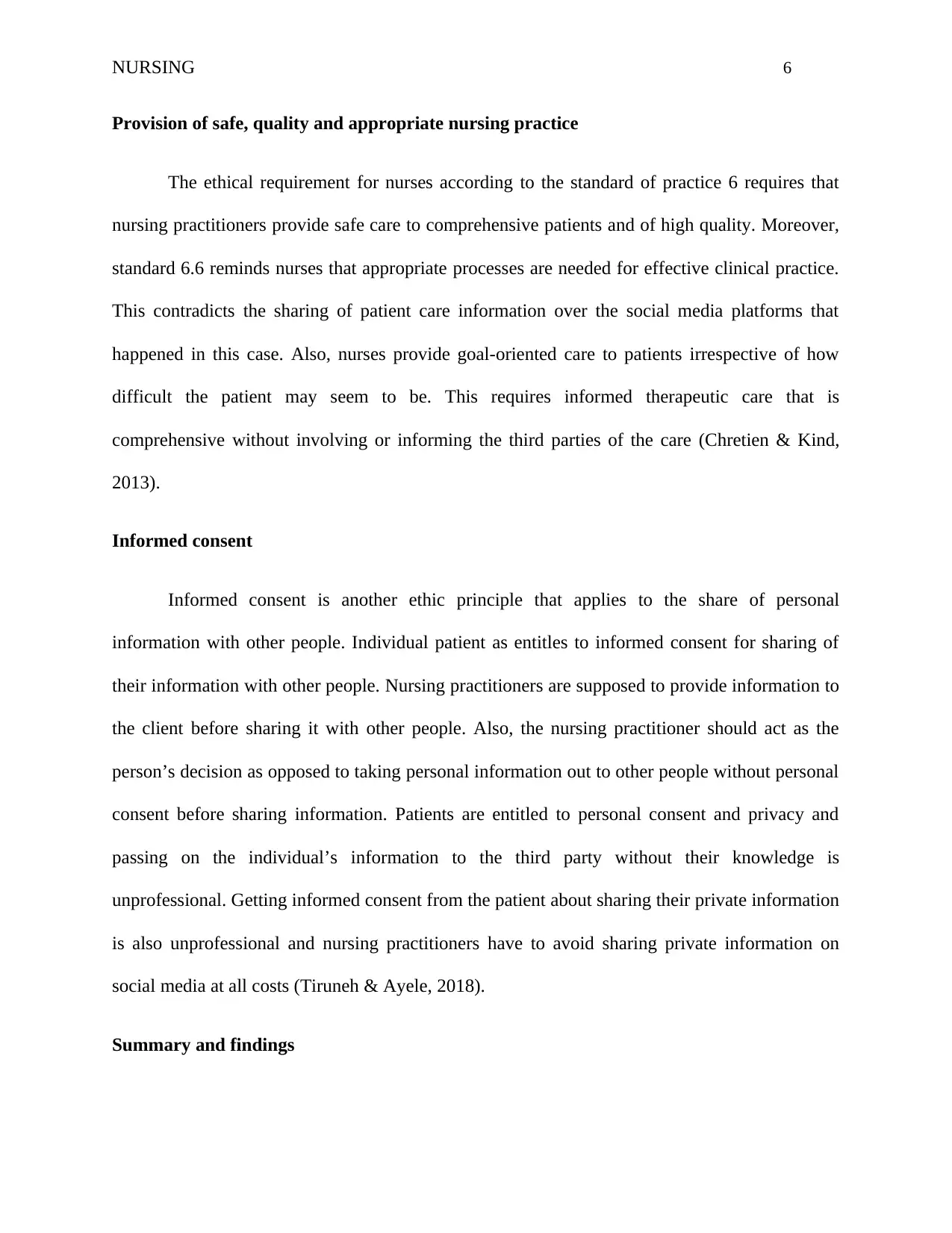
NURSING 6
Provision of safe, quality and appropriate nursing practice
The ethical requirement for nurses according to the standard of practice 6 requires that
nursing practitioners provide safe care to comprehensive patients and of high quality. Moreover,
standard 6.6 reminds nurses that appropriate processes are needed for effective clinical practice.
This contradicts the sharing of patient care information over the social media platforms that
happened in this case. Also, nurses provide goal-oriented care to patients irrespective of how
difficult the patient may seem to be. This requires informed therapeutic care that is
comprehensive without involving or informing the third parties of the care (Chretien & Kind,
2013).
Informed consent
Informed consent is another ethic principle that applies to the share of personal
information with other people. Individual patient as entitles to informed consent for sharing of
their information with other people. Nursing practitioners are supposed to provide information to
the client before sharing it with other people. Also, the nursing practitioner should act as the
person’s decision as opposed to taking personal information out to other people without personal
consent before sharing information. Patients are entitled to personal consent and privacy and
passing on the individual’s information to the third party without their knowledge is
unprofessional. Getting informed consent from the patient about sharing their private information
is also unprofessional and nursing practitioners have to avoid sharing private information on
social media at all costs (Tiruneh & Ayele, 2018).
Summary and findings
Provision of safe, quality and appropriate nursing practice
The ethical requirement for nurses according to the standard of practice 6 requires that
nursing practitioners provide safe care to comprehensive patients and of high quality. Moreover,
standard 6.6 reminds nurses that appropriate processes are needed for effective clinical practice.
This contradicts the sharing of patient care information over the social media platforms that
happened in this case. Also, nurses provide goal-oriented care to patients irrespective of how
difficult the patient may seem to be. This requires informed therapeutic care that is
comprehensive without involving or informing the third parties of the care (Chretien & Kind,
2013).
Informed consent
Informed consent is another ethic principle that applies to the share of personal
information with other people. Individual patient as entitles to informed consent for sharing of
their information with other people. Nursing practitioners are supposed to provide information to
the client before sharing it with other people. Also, the nursing practitioner should act as the
person’s decision as opposed to taking personal information out to other people without personal
consent before sharing information. Patients are entitled to personal consent and privacy and
passing on the individual’s information to the third party without their knowledge is
unprofessional. Getting informed consent from the patient about sharing their private information
is also unprofessional and nursing practitioners have to avoid sharing private information on
social media at all costs (Tiruneh & Ayele, 2018).
Summary and findings
⊘ This is a preview!⊘
Do you want full access?
Subscribe today to unlock all pages.

Trusted by 1+ million students worldwide
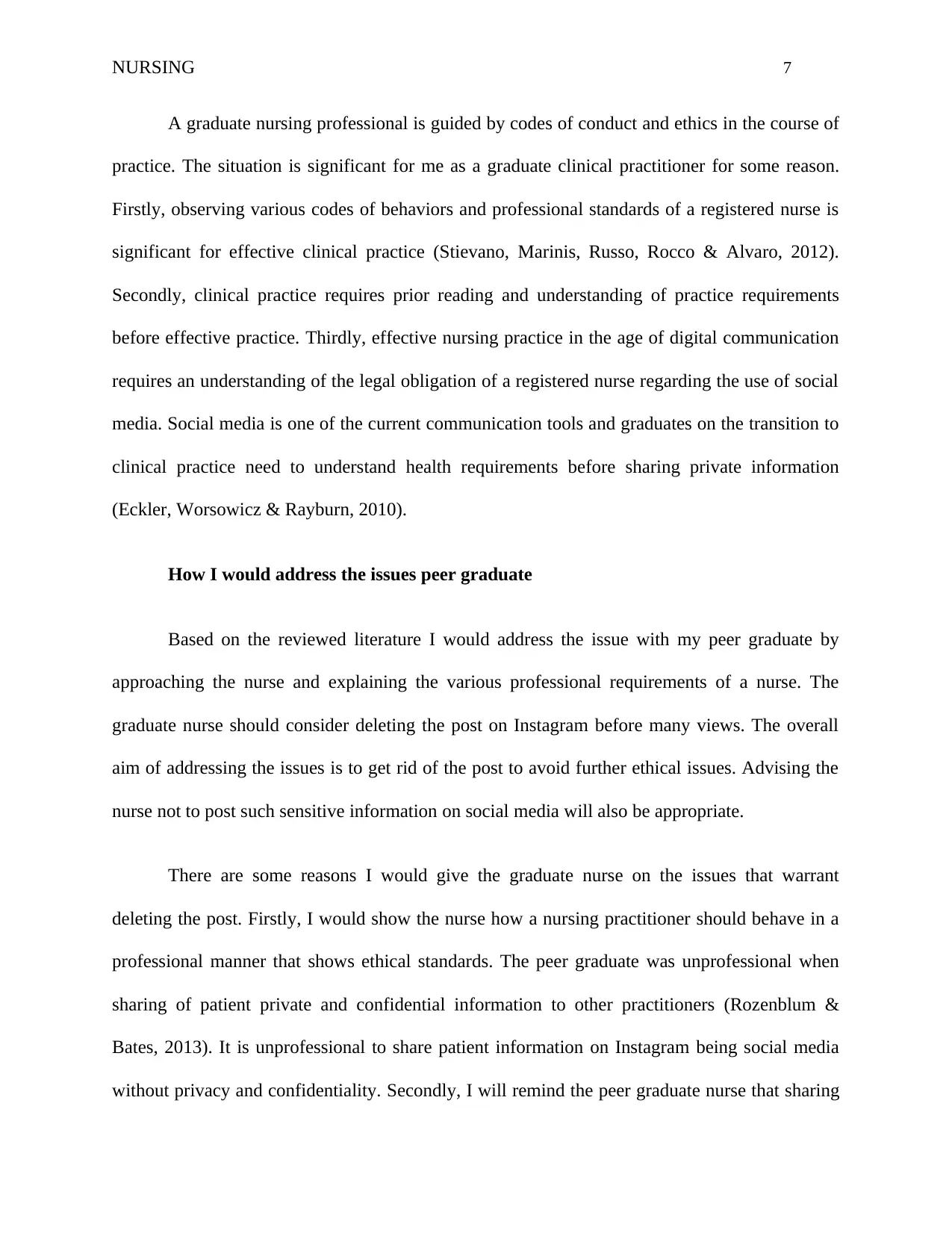
NURSING 7
A graduate nursing professional is guided by codes of conduct and ethics in the course of
practice. The situation is significant for me as a graduate clinical practitioner for some reason.
Firstly, observing various codes of behaviors and professional standards of a registered nurse is
significant for effective clinical practice (Stievano, Marinis, Russo, Rocco & Alvaro, 2012).
Secondly, clinical practice requires prior reading and understanding of practice requirements
before effective practice. Thirdly, effective nursing practice in the age of digital communication
requires an understanding of the legal obligation of a registered nurse regarding the use of social
media. Social media is one of the current communication tools and graduates on the transition to
clinical practice need to understand health requirements before sharing private information
(Eckler, Worsowicz & Rayburn, 2010).
How I would address the issues peer graduate
Based on the reviewed literature I would address the issue with my peer graduate by
approaching the nurse and explaining the various professional requirements of a nurse. The
graduate nurse should consider deleting the post on Instagram before many views. The overall
aim of addressing the issues is to get rid of the post to avoid further ethical issues. Advising the
nurse not to post such sensitive information on social media will also be appropriate.
There are some reasons I would give the graduate nurse on the issues that warrant
deleting the post. Firstly, I would show the nurse how a nursing practitioner should behave in a
professional manner that shows ethical standards. The peer graduate was unprofessional when
sharing of patient private and confidential information to other practitioners (Rozenblum &
Bates, 2013). It is unprofessional to share patient information on Instagram being social media
without privacy and confidentiality. Secondly, I will remind the peer graduate nurse that sharing
A graduate nursing professional is guided by codes of conduct and ethics in the course of
practice. The situation is significant for me as a graduate clinical practitioner for some reason.
Firstly, observing various codes of behaviors and professional standards of a registered nurse is
significant for effective clinical practice (Stievano, Marinis, Russo, Rocco & Alvaro, 2012).
Secondly, clinical practice requires prior reading and understanding of practice requirements
before effective practice. Thirdly, effective nursing practice in the age of digital communication
requires an understanding of the legal obligation of a registered nurse regarding the use of social
media. Social media is one of the current communication tools and graduates on the transition to
clinical practice need to understand health requirements before sharing private information
(Eckler, Worsowicz & Rayburn, 2010).
How I would address the issues peer graduate
Based on the reviewed literature I would address the issue with my peer graduate by
approaching the nurse and explaining the various professional requirements of a nurse. The
graduate nurse should consider deleting the post on Instagram before many views. The overall
aim of addressing the issues is to get rid of the post to avoid further ethical issues. Advising the
nurse not to post such sensitive information on social media will also be appropriate.
There are some reasons I would give the graduate nurse on the issues that warrant
deleting the post. Firstly, I would show the nurse how a nursing practitioner should behave in a
professional manner that shows ethical standards. The peer graduate was unprofessional when
sharing of patient private and confidential information to other practitioners (Rozenblum &
Bates, 2013). It is unprofessional to share patient information on Instagram being social media
without privacy and confidentiality. Secondly, I will remind the peer graduate nurse that sharing
Paraphrase This Document
Need a fresh take? Get an instant paraphrase of this document with our AI Paraphraser
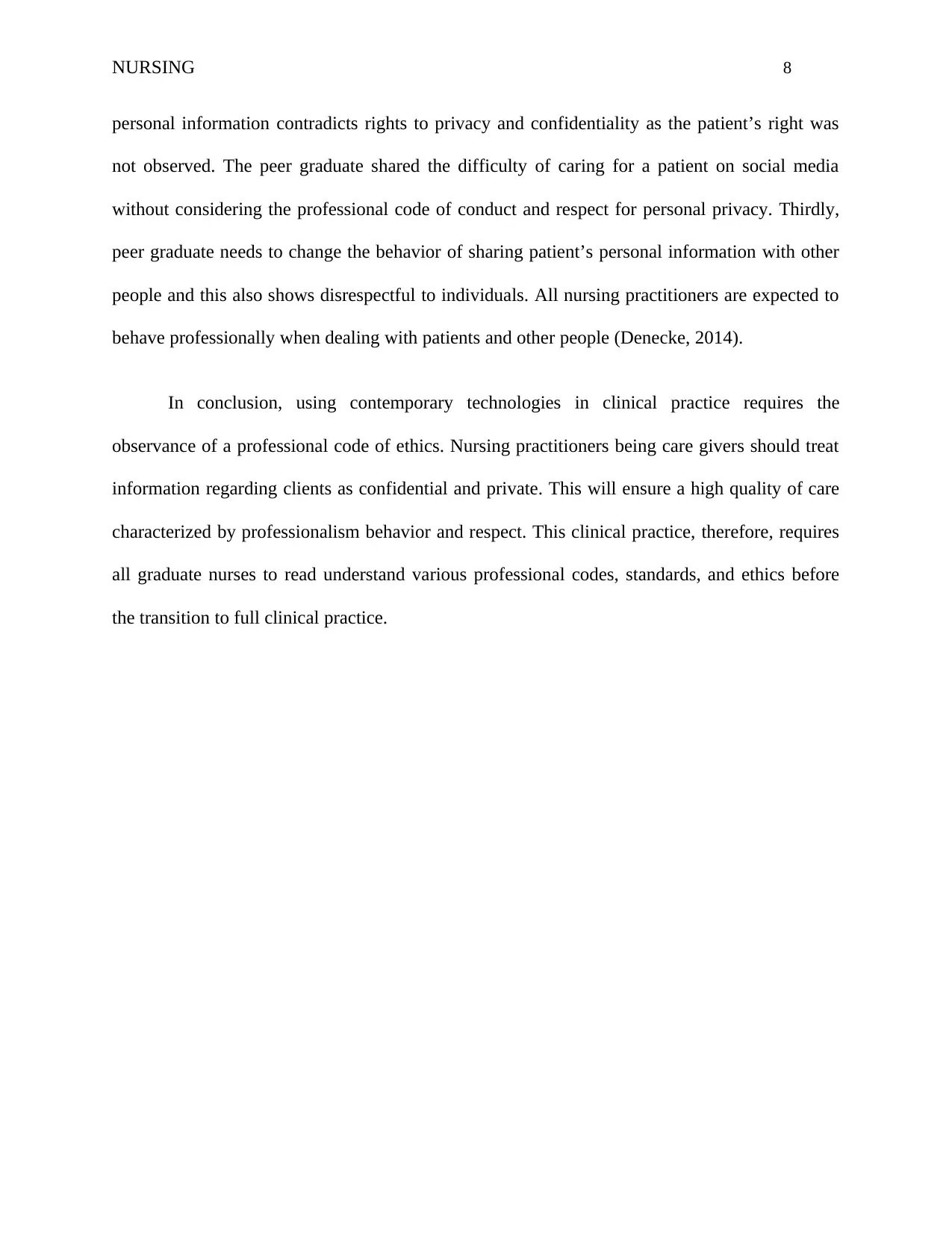
NURSING 8
personal information contradicts rights to privacy and confidentiality as the patient’s right was
not observed. The peer graduate shared the difficulty of caring for a patient on social media
without considering the professional code of conduct and respect for personal privacy. Thirdly,
peer graduate needs to change the behavior of sharing patient’s personal information with other
people and this also shows disrespectful to individuals. All nursing practitioners are expected to
behave professionally when dealing with patients and other people (Denecke, 2014).
In conclusion, using contemporary technologies in clinical practice requires the
observance of a professional code of ethics. Nursing practitioners being care givers should treat
information regarding clients as confidential and private. This will ensure a high quality of care
characterized by professionalism behavior and respect. This clinical practice, therefore, requires
all graduate nurses to read understand various professional codes, standards, and ethics before
the transition to full clinical practice.
personal information contradicts rights to privacy and confidentiality as the patient’s right was
not observed. The peer graduate shared the difficulty of caring for a patient on social media
without considering the professional code of conduct and respect for personal privacy. Thirdly,
peer graduate needs to change the behavior of sharing patient’s personal information with other
people and this also shows disrespectful to individuals. All nursing practitioners are expected to
behave professionally when dealing with patients and other people (Denecke, 2014).
In conclusion, using contemporary technologies in clinical practice requires the
observance of a professional code of ethics. Nursing practitioners being care givers should treat
information regarding clients as confidential and private. This will ensure a high quality of care
characterized by professionalism behavior and respect. This clinical practice, therefore, requires
all graduate nurses to read understand various professional codes, standards, and ethics before
the transition to full clinical practice.
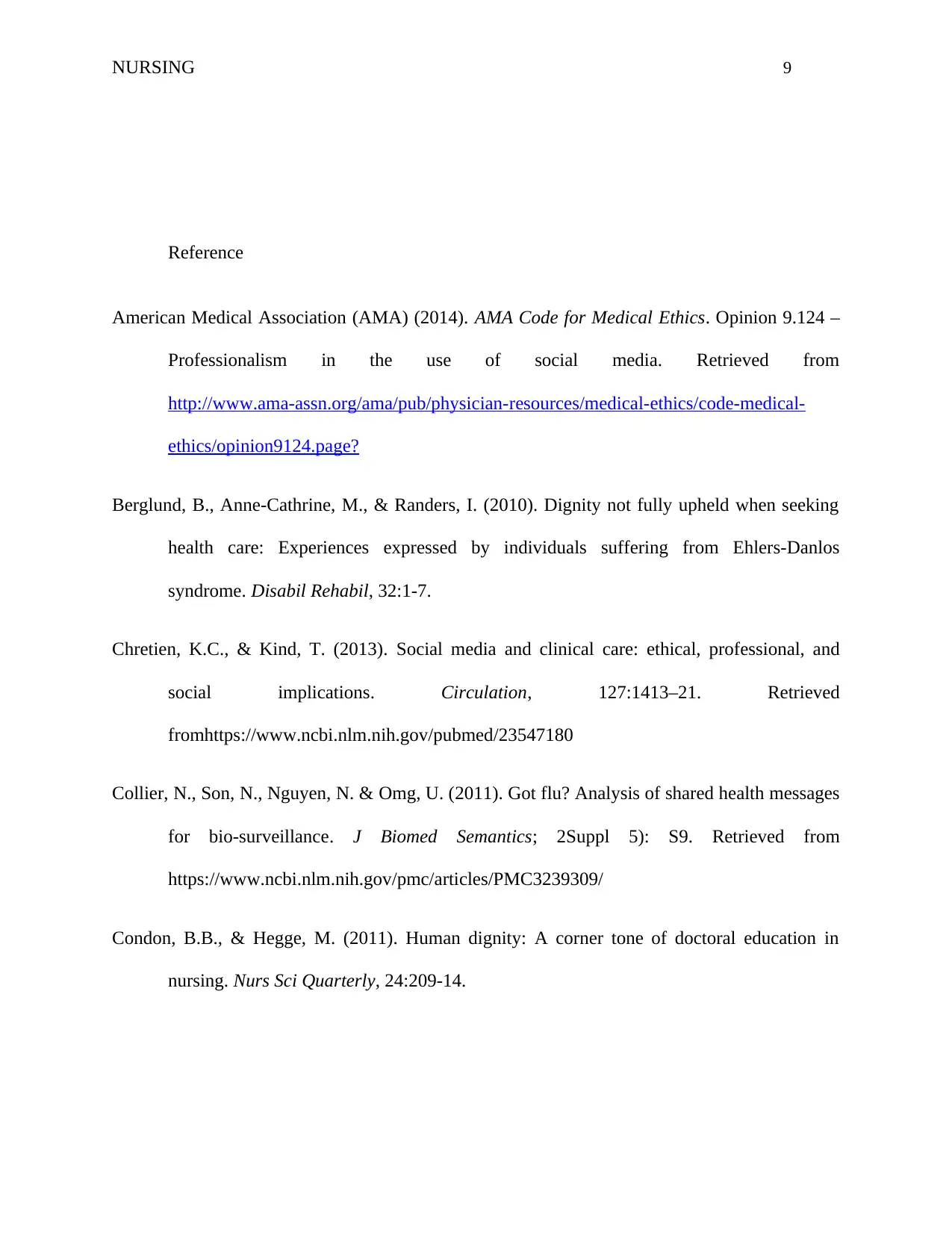
NURSING 9
Reference
American Medical Association (AMA) (2014). AMA Code for Medical Ethics. Opinion 9.124 –
Professionalism in the use of social media. Retrieved from
http://www.ama-assn.org/ama/pub/physician-resources/medical-ethics/code-medical-
ethics/opinion9124.page?
Berglund, B., Anne-Cathrine, M., & Randers, I. (2010). Dignity not fully upheld when seeking
health care: Experiences expressed by individuals suffering from Ehlers-Danlos
syndrome. Disabil Rehabil, 32:1-7.
Chretien, K.C., & Kind, T. (2013). Social media and clinical care: ethical, professional, and
social implications. Circulation, 127:1413–21. Retrieved
fromhttps://www.ncbi.nlm.nih.gov/pubmed/23547180
Collier, N., Son, N., Nguyen, N. & Omg, U. (2011). Got flu? Analysis of shared health messages
for bio-surveillance. J Biomed Semantics; 2Suppl 5): S9. Retrieved from
https://www.ncbi.nlm.nih.gov/pmc/articles/PMC3239309/
Condon, B.B., & Hegge, M. (2011). Human dignity: A corner tone of doctoral education in
nursing. Nurs Sci Quarterly, 24:209-14.
Reference
American Medical Association (AMA) (2014). AMA Code for Medical Ethics. Opinion 9.124 –
Professionalism in the use of social media. Retrieved from
http://www.ama-assn.org/ama/pub/physician-resources/medical-ethics/code-medical-
ethics/opinion9124.page?
Berglund, B., Anne-Cathrine, M., & Randers, I. (2010). Dignity not fully upheld when seeking
health care: Experiences expressed by individuals suffering from Ehlers-Danlos
syndrome. Disabil Rehabil, 32:1-7.
Chretien, K.C., & Kind, T. (2013). Social media and clinical care: ethical, professional, and
social implications. Circulation, 127:1413–21. Retrieved
fromhttps://www.ncbi.nlm.nih.gov/pubmed/23547180
Collier, N., Son, N., Nguyen, N. & Omg, U. (2011). Got flu? Analysis of shared health messages
for bio-surveillance. J Biomed Semantics; 2Suppl 5): S9. Retrieved from
https://www.ncbi.nlm.nih.gov/pmc/articles/PMC3239309/
Condon, B.B., & Hegge, M. (2011). Human dignity: A corner tone of doctoral education in
nursing. Nurs Sci Quarterly, 24:209-14.
⊘ This is a preview!⊘
Do you want full access?
Subscribe today to unlock all pages.

Trusted by 1+ million students worldwide
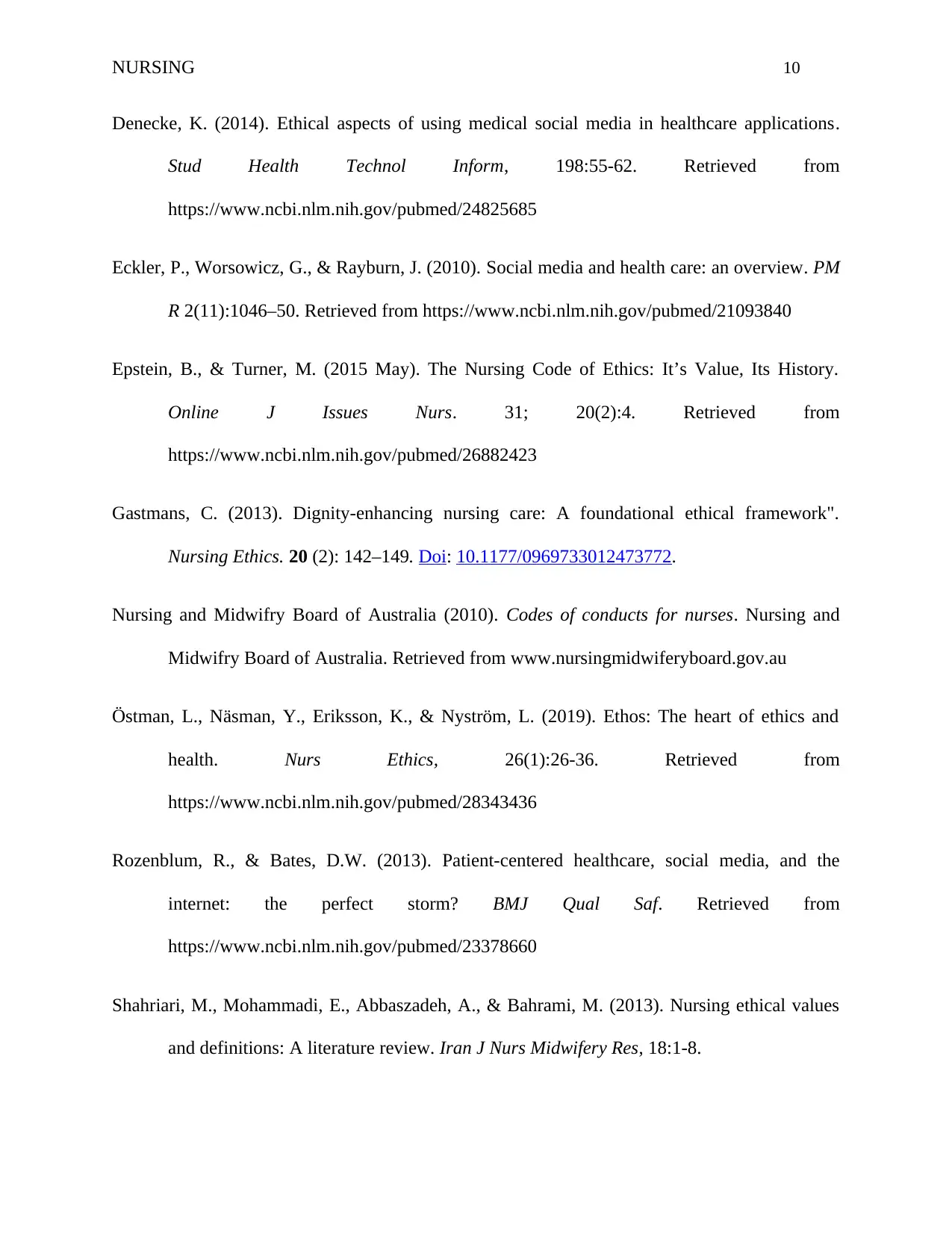
NURSING 10
Denecke, K. (2014). Ethical aspects of using medical social media in healthcare applications.
Stud Health Technol Inform, 198:55-62. Retrieved from
https://www.ncbi.nlm.nih.gov/pubmed/24825685
Eckler, P., Worsowicz, G., & Rayburn, J. (2010). Social media and health care: an overview. PM
R 2(11):1046–50. Retrieved from https://www.ncbi.nlm.nih.gov/pubmed/21093840
Epstein, B., & Turner, M. (2015 May). The Nursing Code of Ethics: It’s Value, Its History.
Online J Issues Nurs. 31; 20(2):4. Retrieved from
https://www.ncbi.nlm.nih.gov/pubmed/26882423
Gastmans, C. (2013). Dignity-enhancing nursing care: A foundational ethical framework".
Nursing Ethics. 20 (2): 142–149. Doi: 10.1177/0969733012473772.
Nursing and Midwifry Board of Australia (2010). Codes of conducts for nurses. Nursing and
Midwifry Board of Australia. Retrieved from www.nursingmidwiferyboard.gov.au
Östman, L., Näsman, Y., Eriksson, K., & Nyström, L. (2019). Ethos: The heart of ethics and
health. Nurs Ethics, 26(1):26-36. Retrieved from
https://www.ncbi.nlm.nih.gov/pubmed/28343436
Rozenblum, R., & Bates, D.W. (2013). Patient-centered healthcare, social media, and the
internet: the perfect storm? BMJ Qual Saf. Retrieved from
https://www.ncbi.nlm.nih.gov/pubmed/23378660
Shahriari, M., Mohammadi, E., Abbaszadeh, A., & Bahrami, M. (2013). Nursing ethical values
and definitions: A literature review. Iran J Nurs Midwifery Res, 18:1-8.
Denecke, K. (2014). Ethical aspects of using medical social media in healthcare applications.
Stud Health Technol Inform, 198:55-62. Retrieved from
https://www.ncbi.nlm.nih.gov/pubmed/24825685
Eckler, P., Worsowicz, G., & Rayburn, J. (2010). Social media and health care: an overview. PM
R 2(11):1046–50. Retrieved from https://www.ncbi.nlm.nih.gov/pubmed/21093840
Epstein, B., & Turner, M. (2015 May). The Nursing Code of Ethics: It’s Value, Its History.
Online J Issues Nurs. 31; 20(2):4. Retrieved from
https://www.ncbi.nlm.nih.gov/pubmed/26882423
Gastmans, C. (2013). Dignity-enhancing nursing care: A foundational ethical framework".
Nursing Ethics. 20 (2): 142–149. Doi: 10.1177/0969733012473772.
Nursing and Midwifry Board of Australia (2010). Codes of conducts for nurses. Nursing and
Midwifry Board of Australia. Retrieved from www.nursingmidwiferyboard.gov.au
Östman, L., Näsman, Y., Eriksson, K., & Nyström, L. (2019). Ethos: The heart of ethics and
health. Nurs Ethics, 26(1):26-36. Retrieved from
https://www.ncbi.nlm.nih.gov/pubmed/28343436
Rozenblum, R., & Bates, D.W. (2013). Patient-centered healthcare, social media, and the
internet: the perfect storm? BMJ Qual Saf. Retrieved from
https://www.ncbi.nlm.nih.gov/pubmed/23378660
Shahriari, M., Mohammadi, E., Abbaszadeh, A., & Bahrami, M. (2013). Nursing ethical values
and definitions: A literature review. Iran J Nurs Midwifery Res, 18:1-8.
Paraphrase This Document
Need a fresh take? Get an instant paraphrase of this document with our AI Paraphraser
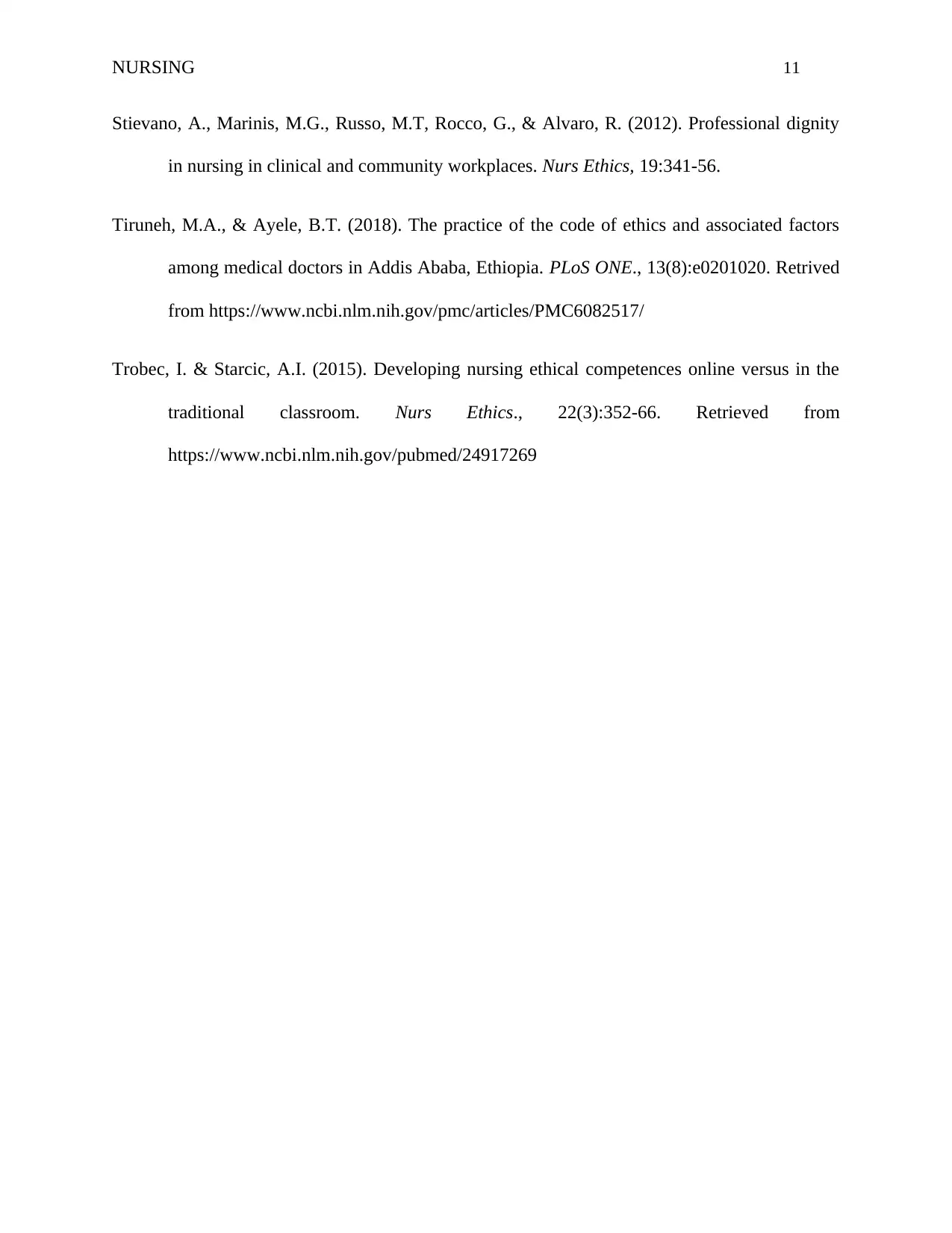
NURSING 11
Stievano, A., Marinis, M.G., Russo, M.T, Rocco, G., & Alvaro, R. (2012). Professional dignity
in nursing in clinical and community workplaces. Nurs Ethics, 19:341-56.
Tiruneh, M.A., & Ayele, B.T. (2018). The practice of the code of ethics and associated factors
among medical doctors in Addis Ababa, Ethiopia. PLoS ONE., 13(8):e0201020. Retrived
from https://www.ncbi.nlm.nih.gov/pmc/articles/PMC6082517/
Trobec, I. & Starcic, A.I. (2015). Developing nursing ethical competences online versus in the
traditional classroom. Nurs Ethics., 22(3):352-66. Retrieved from
https://www.ncbi.nlm.nih.gov/pubmed/24917269
Stievano, A., Marinis, M.G., Russo, M.T, Rocco, G., & Alvaro, R. (2012). Professional dignity
in nursing in clinical and community workplaces. Nurs Ethics, 19:341-56.
Tiruneh, M.A., & Ayele, B.T. (2018). The practice of the code of ethics and associated factors
among medical doctors in Addis Ababa, Ethiopia. PLoS ONE., 13(8):e0201020. Retrived
from https://www.ncbi.nlm.nih.gov/pmc/articles/PMC6082517/
Trobec, I. & Starcic, A.I. (2015). Developing nursing ethical competences online versus in the
traditional classroom. Nurs Ethics., 22(3):352-66. Retrieved from
https://www.ncbi.nlm.nih.gov/pubmed/24917269
1 out of 11
Related Documents
Your All-in-One AI-Powered Toolkit for Academic Success.
+13062052269
info@desklib.com
Available 24*7 on WhatsApp / Email
![[object Object]](/_next/static/media/star-bottom.7253800d.svg)
Unlock your academic potential
Copyright © 2020–2026 A2Z Services. All Rights Reserved. Developed and managed by ZUCOL.





